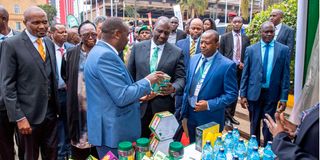UNDP study will help enhance resilience of agropastoralists

President William Ruto flagging off value-added tea to Accra, Ghana during the Africa Continental Free Trade Area Guided Trade Initiative at KICC, Nairobi County. AfCFTA envisions a prosperous economic community where goods, people and services are free to move, to meet market needs and their aspirations for a better quality of life for all Africans.
In the current globalised world, African countries cannot easily advance their development aspirations in isolation.
This calls for regional integration. Policy-level advocacy for evidence-driven and community-focused development interventions in African borderlands can serve as a springboard for regional integration, as envisioned by the AU agenda 2063, the Abuja treaty, the AU border governance strategy and other relevant instruments.
Regional integration can give farmers, pastoralists and informal cross-border traders in African borderlands access to regional markets, link them to value chains, enhance their productivity and competitiveness, and ultimately improve their living standards.
Elimination of barriers to trade and free movement and harmonisation of economic policies and regulatory systems can be considered key steps for regional integration.
The Africa Continental Free Trade Area (AfCFTA) envisions a prosperous economic community where goods, people and services are free to move, to meet market needs and their aspirations for a better quality of life for all Africans.
Of these, farmers, pastoralists and informal cross-border traders, who constitute the majority of the 270 million people living in African borderlands, can benefit from interventions to enhance their productivity and competitiveness.
Agro-pastoral communities and informal cross-border traders living in east and west African borderlands face challenges such as insecurity, abject poverty, climate change impact, limited state presence, limited access to infrastructure and chronic lack of access to water and finance.
These challenges pose the risk of the communities being permanently left behind. However, they are very resilient amid all these challenges and, if better supported, there is huge potential for transformational change in these geographic regions.
It was with this firm belief that the UNDP Africa borderlands centre embarked on conducting flagship research titled ‘Promise, peril and resilience: Voices of agro-pastoralists in Africa borderland regions’. This research was designed to investigate the multiple vulnerabilities the agropastoralists face and identify the sources of their resilience, from the perspectives of the farmers and pastoralists themselves.
Actionable data
It highlights the complex and diverse issues facing these areas, which often sit at the intersection of multiple countries, cultures and economic systems. It seeks to empower those looking for actionable data from these marginalised communities and provides timely information derived directly from those uniquely resilient communities from their own perspectives.
One of the key findings of the report is the importance of labour diversification as a key strategy for the resilience of farmers and pastoralists. Informal cross-border trade is a well-known practice that is employed by farmers and pastoralists, in times of unfavourable conditions for farming and pastoralism.
The report also notes that border regions often face significant barriers to trade and investment, including infrastructure deficiencies, regulatory hurdles and security concerns. It recommends the elimination of barriers and harmonisation of policies and regulatory systems.
Another critical challenge is access to finance for informal cross-border trade. The report emphasises the importance of financial inclusion measures in catalysing development in those geographic regions.
Cross-border mobility is a key resilience strategy for these groups. This practice is affected by policy restrictions, border closures and other barrier measures. Therefore, the report recommends policy interventions that facilitate safe and free cross-border mobility.
The report highlights the complex security and stability challenges facing border regions. These areas are often vulnerable to transnational criminal networks and terrorist groups. It suggests that these security threats be fixed through a combination of law enforcement, development efforts and greater regional cooperation.
Finally, the report blames climate change's impact on the sharp decline of farm productivity and lack of water and pasture for herders. To avert this risk, it recommends investing in groundwater exploration for human, animal and agricultural use.
The research by the UNDP Africa Borderlands Centre not only investigates the challenges faced by agropastoralists but also highlights areas that can be built on to enhance resilience among agropastoralists.
The findings and recommendations of the report, and the audio-visual materials that practically demonstrate the lived experiences of agropastoralists in African borderlands, constitute valuable resources for policymakers, development practitioners and other stakeholders.
Dr Ummer is Team Leader and Senior Technical Adviser at the Africa Borderlands Centre.




